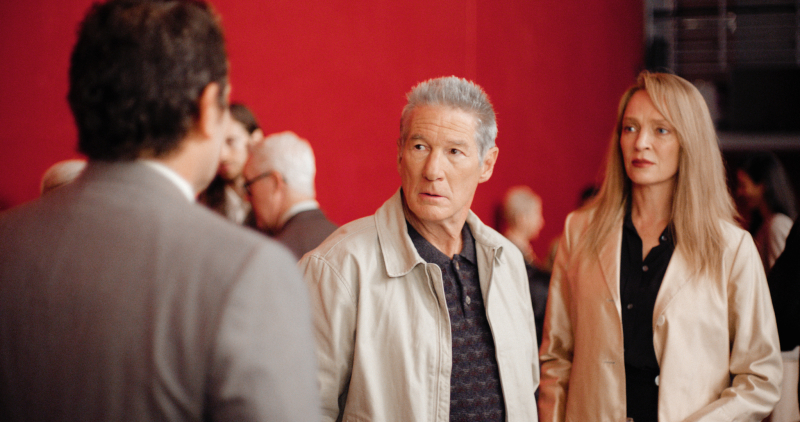
Kino Lorber
MOVIE REVIEW
Oh, Canada (2024)
According to the cliché Paul Schrader‘s tormented males journal their pain and get it down on paper; but in “Oh, Canada” Leonard Fife (Richard Gere) might struggle to hold the pen. Enfeebled by terminal cancer, stuck in a wheelchair and in need of assistance on and off the lavatory, Leonard does a more cinematic thing and unburdens himself to a camera instead. As a renowned documentarian – the “Ken Burns of Canada” we hear – Leonard is supposed to be telling a camera crew about his life and times, including the 1960s flight from the U.S. Vietnam War draft that took him to the slower waters north of the border in the first place. This testimony involves Leonard directly addressing the camera, which the film, as an inside joke, calls the signature style of his documentaries. Mr. Schrader and anyone familiar with the work of Errol Morris knows that it’s actually the Interrotron set-up that Mr. Morris uses for his own documentaries, designed to torment interviewees and lever confessions out of people who know they have things to confess. Leonard fits the bill.
The plot skips around between periods in Leonard’s life. When younger, and played by Jacob Elordi, he worked his way through a sequence of women queuing up to be close to him, or fall into bed with him, or get pregnant by him. Young Leonard seems rootless and uncertain of his place, although that might be putting a positive spin on a base fear of commitment and a mean streak. In the 1960s he gets as far as marrying Alicia (Kristine Froseth) and raising a young son. But when the prospect of normy stability and a place on the board of her family’s company arises, Leonard makes a weak excuse to leave and simply abandons them all without looking back. Even he might not be able to say why. In the present and married to the younger Emma (Uma Thurman), Mr. Gere’s Leonard makes an unreliable narrator and he knows it, memories bending under the weight of cancer medication and churning remorse. The film drops the older actor into the younger one’s flashbacks, a vertiginous way for a character to find that the past isn’t done with him; one that as it happens “The Penguin” TV series just did too for similar purposes.
Spurred by the general state of things, Mr. Schrader is on a tear of films – “First Reformed,” “The Card Counter” and “Master Gardener” – that simmered with political aggro. Their males, labeled as members of the God’s Lonely Man tribe (another inaccurate Schrader cliché, as if he did nothing but remake “Taxi Driver”) are grasping at the metaphorical furniture for support as they lose their bearings. Leonard Fife doesn’t have a gun to pick up or a bomb to assemble, and his activist documentaries seem to have hit their targets; but he’s lost the ability to think of himself as a good man, with disastrous results and some belated justice. If there was an original sin involved here, it may have been America’s decision to wage the Vietnam War in the first place; one of the film’s furthest reaches back into the past is Leonard’s effort to evade the draft by indicating he’s gay, which looks like a vexed betrayal of his country and his own character and homosexuals all at once. The past is filmed in widescreen, a broad view of open possibilities, while Leonard’s cancerous present sits squeezed into a square aspect ratio of narrow choices and confined spaces. Four and a half decades after they made “American Gigolo” and nearer the final fade-out by the same amount, Mr. Gere and Mr. Schrader are again fully simpatico about the nature of the male condition stuck in that box, this time the condition of the intellectual gigolo looking at the damage in his wake. Painful for anyone, but it’s the thought that counts.
Comments